Results 1 to 10 of 74
Thread: electrolysis for rusty razor
-
09-19-2012, 08:29 PM #1Member

- Join Date
- Feb 2011
- Location
- Columbia Falls, MT
- Posts
- 52
Thanked: 7 electrolysis for rusty razor
electrolysis for rusty razor
I cannot remember seeing a thread for this subject so I'll be the guinea pig, here. I have cleaned various pieces of rusted metal using my battery charger and an old piece of steel. Can I do the same for a rusty razor (handle intact) or will the process eat away at the edge enough to destroy it? Anybody have any experience doing this?
-
09-19-2012, 09:59 PM #2< Banned User >

- Join Date
- Jul 2011
- Posts
- 471
Thanked: 46
got pics?...we could help you more on this..
-
09-19-2012, 10:04 PM #3At this point in time...




- Join Date
- Jun 2007
- Location
- North Idaho Redoubt
- Posts
- 27,061
- Blog Entries
- 1
Thanked: 13249
So far no one has been able to do it Steve,,, The real trick is even if you could say "Alakazam" and ever bit of rust came off the blade in an instant, you would still be left with the pitting under there... As you already mentioned the Electroysis can tear up the very thin razor edge too...
I would try with a rusty heavy near wedge first and see what you can do with it,, that gives you a ton of steel to mess with ..
In fact if all budding restorers started with the old heavy wedges they would have way less problems
PICS !!!!! of the process and details hehehe there are a few threads on here of people that have tried it you might look through and see the results and mistakes so you don't repeat the same...Last edited by gssixgun; 09-19-2012 at 10:06 PM.
-
09-19-2012, 10:09 PM #4

Here was my recent attempt.
http://straightrazorpalace.com/works...ysis-sort.html
Something definitely happened, but it isn't something I'm likely to ever try again with a razor. Apart from satisfying my inner science geek, this didn't come anywhere near to the kind of enjoyment I get from the manual process.
Last edited by Cangooner; 09-19-2012 at 10:20 PM.
It was in original condition, faded red, well-worn, but nice.
This was and still is my favorite combination; beautiful, original, and worn.
-Neil Young
-
09-20-2012, 12:36 AM #5

Cangooner, I think the problem was the set up for your experiment. Only the side of the item you want to remove rust from facing the anode (+) will be affected by the process. Additionally, the closer the item is to the anode, the more effective the process. Here is my rig, for what it is worth:
I use a 2 gallon plastic paint bucket. Inside, I have 7 plates of metal I soldered together using wire to form a circle and and attached a cooper wire to exit the bucket for attaching the anode (+) side of a 2 amp motorcycle charger. I have a 10 amp car battery charger but wanted to be cautious with the razor blade. The 2 amps turned out to be sufficient. I hang the blade from a piece of wood which I wrapped another copper wire around. This wire is connected to the razor and gets connected to the cathode (-) of the charger. I hang the blade in the center of the circle and plug in the charger. I let it cook until there is no more electro/chemical reaction (i.e.: the process stops bubbling). Before hanging the item in the bucket, be sure to use a continuity tester to see that you have good contact between the copper wire and the blade. If not, the process will not work. Sand away a little rust or what ever is necessary until you have a complete circuit between the cathode copper wire and the blade. By the way, I use regular baking soda but intend to try the washing soda in the future.
The proof as they say is in the pudding. But I know everyone on this forum wants pictures so here are some.
My electrolytic rust removal rig. Notice all the gunk the process has already removed floating on top.
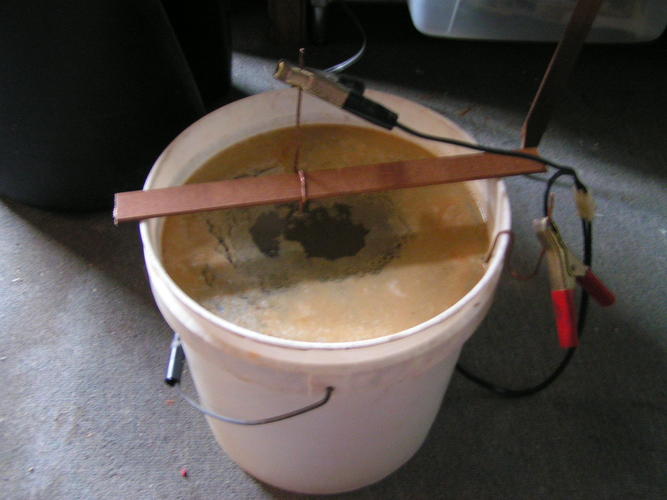
Here is the blade before I started the process.
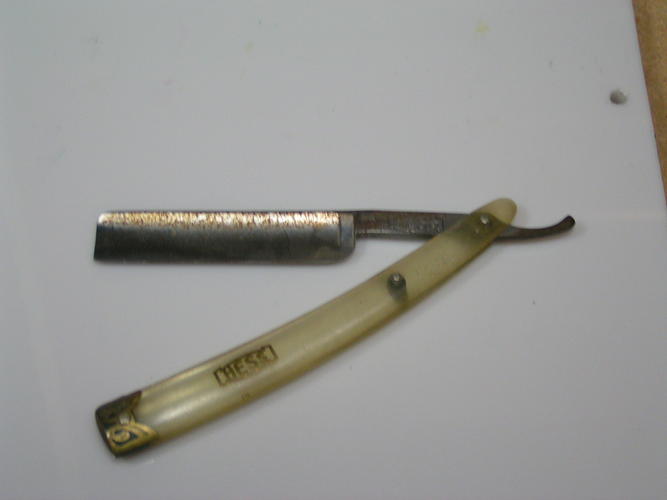
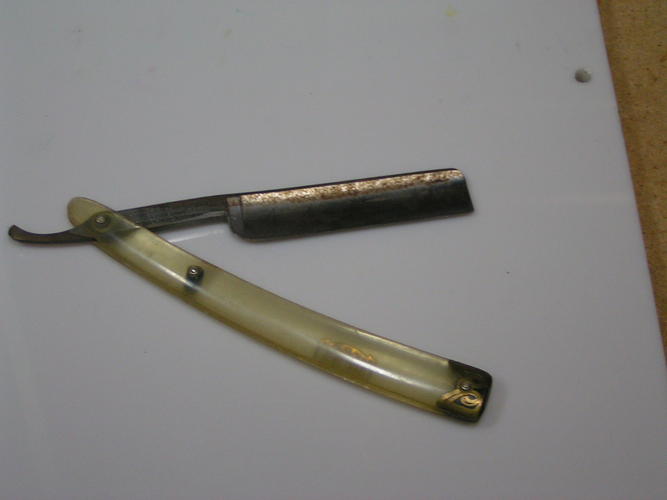
Here are pictures after the process.
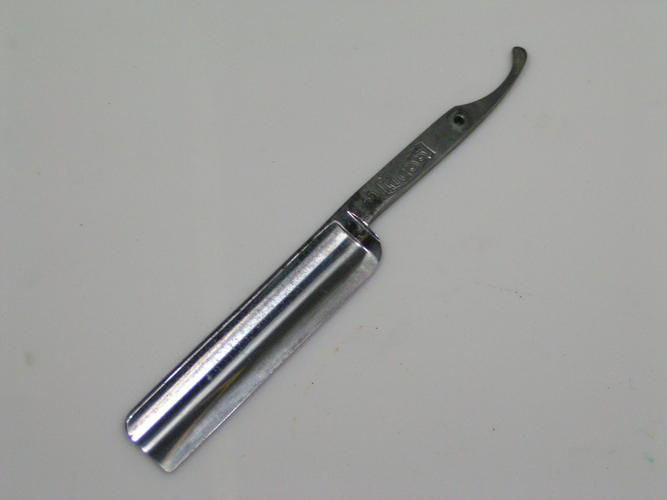
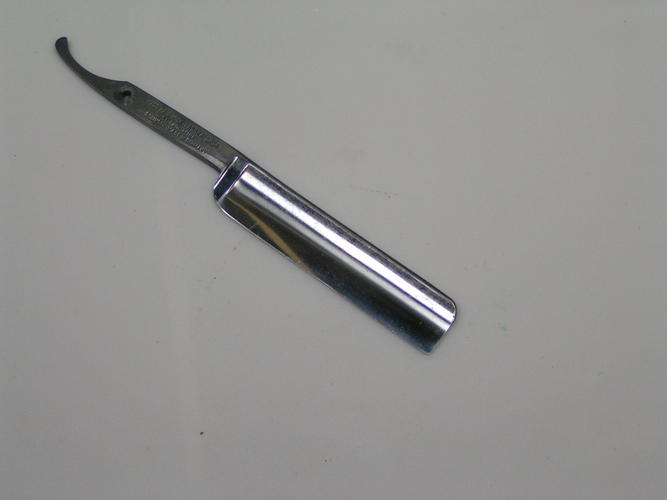
At this point the nay-Sayers are going to say it is a waste of time because you have to sand the blade anyhow. Not necessarily! I took the blade and put it in a tumbler for two days and it turned out marvelous. To my naked eye, I thought it was a new blade. Then when I was getting ready to assemble the razor, I was standing under a sky-light in my kitchen and when the sun it the blade just right I saw some micro scratches. I then put in 30 minutes of sanding but the scratches would not come out. I was happy with the blade before so back into the tumbler it went for a day. I am now ready to reassemble the razor and will be debuting the finished razor within the next couple of weeks.
Lets just say I am a big fan of electrolysis. Here is another example for the nay-Sayers.
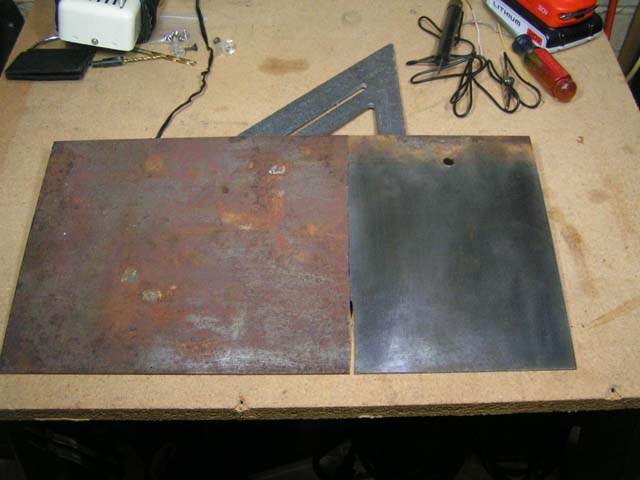
I literally spent less than one minute with a Scotch Bite pad before taking the picture. Would anyone rally prefer to sand off all that rust when it could be coming off by itself while you are doing something else? Not me!
My 2 cents, nothing more. It works for me.
But to be honest, this is NOT a panacea for the condition of razors with rust. It will not remove pits or scratches. But here is my take on that: Sometimes I think we (including myself) get caught up in trying to have a pristine looking razor when what we should be focusing on is whether the razor is clean, hones up well, holds an edge and gives a close, smooth shave. If it has pits, so what? It is your private razor and will not be seen by others. Not all of us, especially beginners, can match the expertise of people who have spent years refining their skills and techniques. That should not stop us from doing the best we can on this razor, and trying to do better on the next. I love seeing what the skilled restorer can do to a razor. It motivates me to be better than I am today. But I can not compare my results to theirs. If I have done my best today and learn from the experience, I'll do better tomorrow.
Okay, I got carried away.
Randy“Tell me and I forget. Teach me and I remember. Involve me and I learn.” Ben Franklin
-
09-20-2012, 12:49 AM #6Just a guy with free time.

- Join Date
- Oct 2011
- Location
- Mid state Illinois
- Posts
- 1,448
Thanked: 247
Seems like it worked pretty well for you. There was a guy from another forum that did it with success as well. I think a reason restorers might not embrace it is because I imagine they receive multiple razors everyday. They'd have to be juggling several different electrolysis rigs in different stages of "done" at any given moment. Might get confusing. Just a thought. Anyways, I like what you did, and I think it worked really well.
-
09-20-2012, 01:55 AM #7Senior Member

- Join Date
- Mar 2011
- Location
- Corcoran, Minnesota
- Posts
- 665
Thanked: 170
When I tried it, I used a coffee can with the bottom cut out for an anode. I used a 10 amp charger, which was way too much power. Burned up a sacrificial razor when it accidentally touched the can. If I try it again, I'll use the 2 amp - sounds like that is just enough power. Thanks for posting your method and results, Randy.
-
09-20-2012, 02:06 AM #8

Yeah, I'd say that's a safe bet for any number of reasons!

Thanks for this - it's great to see what can happen if one knows what one is doing. But i think that even if I could get it to work that well every time, I'd still choose not to. The other ways (sanding, buffing, polishing, etc.) are just too much fun. I think removing them from the process would remove a fair chunk of the enjoyment of the process.Last edited by Cangooner; 09-20-2012 at 02:17 AM.
It was in original condition, faded red, well-worn, but nice.
This was and still is my favorite combination; beautiful, original, and worn.
-Neil Young
-
09-20-2012, 02:08 AM #9At this point in time...




- Join Date
- Jun 2007
- Location
- North Idaho Redoubt
- Posts
- 27,061
- Blog Entries
- 1
Thanked: 13249
-
09-20-2012, 03:00 AM #10Just a guy with free time.

- Join Date
- Oct 2011
- Location
- Mid state Illinois
- Posts
- 1,448
Thanked: 247 Well shoot...I restore razors...That's a reason I wouldn't do it. So there!Nope...
Well shoot...I restore razors...That's a reason I wouldn't do it. So there!Nope...
That is not the reason I don't use it anyway I prefer them out on the counter where I can see them, instead of inside 16 different buckets full of goopy sludge with a numbered tag hanging off the side telling me when I put it in the bucket and when it needs to come out.
I prefer them out on the counter where I can see them, instead of inside 16 different buckets full of goopy sludge with a numbered tag hanging off the side telling me when I put it in the bucket and when it needs to come out.  Other than that, I still like the idea. And I'll still try it someday.
Other than that, I still like the idea. And I'll still try it someday.  But just for one.
But just for one.
I'll find you the link to a successful trial of electrolysis Gssixgun. IIRC..and that's a big if, it did remove ALL stains and rust. It ofc, did not remove the holes where the black used to be. I thought the guy was a member here too...
I thought the guy was a member here too...
http://www.razorandstone.com/showthr...t=electrolysis Well..here's the link...and nvm. Not so successful as I remembered. Using electrolysis seems to just be adding another step to the process.
Not so successful as I remembered. Using electrolysis seems to just be adding another step to the process.
Last edited by regularjoe; 09-20-2012 at 03:12 AM.


 59Likes
59Likes LinkBack URL
LinkBack URL About LinkBacks
About LinkBacks






 Reply With Quote
Reply With Quote






